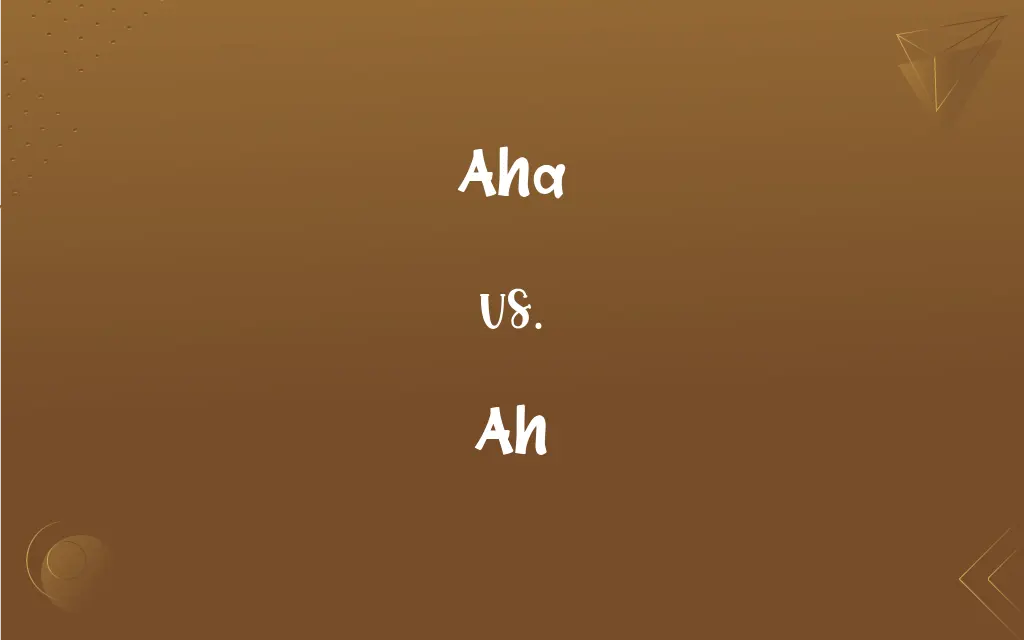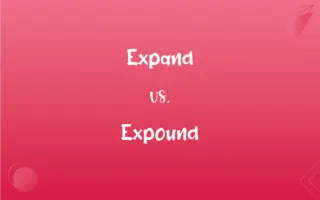Aha vs. Ah: What's the Difference?
By Harlon Moss & Janet White || Updated on May 24, 2024
"Aha" indicates a sudden realization or discovery, while "ah" is an exclamation expressing a range of emotions such as surprise, relief, or understanding.

Key Differences
"Aha" is an exclamation typically used when someone has a sudden realization or understanding of something. "Ah" is a more versatile exclamation that can express a wide range of emotions, including surprise, relief, satisfaction, or even sadness.
When someone says "aha," it is generally in the context of discovering a solution or recognizing an important detail. This term is specific to moments of enlightenment or epiphany, adding a sense of revelation to the situation. On the other hand, "ah" is often used to convey more immediate and varied reactions. It can be an instinctive response to many different scenarios, making it more flexible in its usage compared to "aha."
In literature and dialogue, "aha" is frequently employed to highlight a character's moment of discovery, making it clear to the reader that something significant has been realized. Meanwhile, "ah" can be used to convey subtler emotional nuances, fitting into a broader range of contexts and interactions.
The usage of "aha" is more focused on cognitive processes, often marking the point where a character or person figures something out. "Ah," however, is more about immediate emotional responses, whether positive or negative.
While "aha" is tightly linked to sudden understanding and realization, "ah" covers a broader spectrum of immediate emotional expressions, making each term unique in its specific context and application.
ADVERTISEMENT
Comparison Chart
Function
Indicates realization or discovery
Expresses various emotions
Emotional Range
Limited to moments of clarity
Wide range (surprise, relief, admiration, etc.)
Typical Usage
Cognitive breakthroughs
Immediate reactions
Context in Literature
Highlights significant realizations
Conveys subtle emotional nuances
Flexibility
Specific to understanding
Versatile in emotional expression
ADVERTISEMENT
Aha and Ah Definitions
Aha
An exclamation indicating sudden realization or insight.
Aha! Now I see how it works.
Ah
An exclamation of surprise.
Ah! You startled me.
Aha
Used to express the satisfaction of discovering something.
Aha, I knew you were hiding something!
Ah
A way to convey understanding or acknowledgment.
Ah, I see what you're saying now.
Aha
Indicates understanding after confusion.
Aha, so that's what you meant!
Ah
An exclamation of disappointment or sorrow.
Ah, that's unfortunate news.
Aha
An expression of triumphant discovery.
Aha! I've finally cracked the code.
Ah
An expression of pleasure or enjoyment.
Ah, this soup is delicious.
Aha
A reaction to solving a problem.
Aha! The missing piece fits here perfectly.
Ah
A reaction of regret or longing.
Ah, if only I had more time.
Aha
Used to express surprise, pleasure, or triumph.
Ah
Used to express various emotions, such as satisfaction, surprise, delight, dislike, or pain.
Aha
An exclamation of understanding, realization, invention, or recognition.
Aha! That will work.
Ah
An expression of relief, relaxation, comfort, confusion, understanding, wonder, awe, etc. according to uttered inflection.
Ah, I understand now.
Ah! It's good to be back home!
Ah, the flowers of spring.
Aha
An exclamation of surprise, exaltation, or contempt.
Aha! Now I've got you!
Ah
A syllable used to fill space, particularly in music.
Aha
An exclamation expressing, by different intonations, triumph, mixed with derision or irony, or simple surprise.
Ah
An instance of the interjection ah.
The crowd's oohs and ahs at the fireworks
Aha
A sunk fence. See Ha-ha.
Ah
To give a cry of "ah".
Ah
Pronunciation spelling of I#Pronoun
Ah
An exclamation, expressive of surprise, pity, complaint, entreaty, contempt, threatening, delight, triumph, etc., according to the manner of utterance.
FAQs
What does "ah" mean?
"Ah" is an exclamation that can express various emotions, including surprise, pleasure, regret, and disappointment.
When is "ah" typically used?
"Ah" is used in a variety of contexts to convey different emotions, depending on the tone and situation.
Can "aha" express surprise?
Yes, but it primarily conveys the surprise of sudden understanding or discovery.
Is "ah" used in everyday conversation?
Yes, "ah" is commonly used in everyday speech to express a range of emotions.
When is "aha" typically used?
"Aha" is used in moments of sudden realization or when someone solves a problem or understands something new.
Can "ah" be used sarcastically?
Yes, "ah" can be used sarcastically depending on the tone and context.
Can "aha" be used sarcastically?
Yes, "aha" can be used sarcastically to mock someone's realization or understanding.
Can "ah" express realization?
Yes, "ah" can be used to express realization, but it is less specific and more general than "aha."
What does "aha" mean?
"Aha" is an exclamation used to express sudden realization, discovery, or understanding.
Is "aha" used in written language?
Yes, "aha" can be used in written language, especially in dialogues and narratives to indicate a character's realization.
Does "aha" have any synonyms?
Yes, synonyms for "aha" include "eureka," "I see," and "I got it."
Does "ah" have any synonyms?
Yes, synonyms for "ah" include "oh," "wow," and "alas," depending on the context.
Is "aha" used in everyday conversation?
Yes, but it is specifically used during moments of realization or discovery.
What emotions can "ah" convey?
"Ah" can convey surprise, pleasure, regret, disappointment, and understanding.
Can "ah" be used in formal writing?
"Ah" can be used in formal writing, especially in dialogues or to convey specific emotional reactions.
What emotion does "aha" primarily convey?
"Aha" primarily conveys joy, satisfaction, and realization.
Which term is more versatile, "aha" or "ah"?
"Ah" is more versatile as it can express a wider range of emotions and reactions.
Can "aha" be used in formal writing?
"Aha" is less common in formal writing and is typically found in informal contexts or direct quotes.
Is "ah" used in written language?
Yes, "ah" is frequently used in written language to convey various emotions in dialogues and narratives.
Is "aha" more specific than "ah"?
Yes, "aha" is more specific to moments of realization or discovery, while "ah" covers a broader range of emotions.
About Author
Written by
Harlon MossHarlon is a seasoned quality moderator and accomplished content writer for Difference Wiki. An alumnus of the prestigious University of California, he earned his degree in Computer Science. Leveraging his academic background, Harlon brings a meticulous and informed perspective to his work, ensuring content accuracy and excellence.
Co-written by
Janet WhiteJanet White has been an esteemed writer and blogger for Difference Wiki. Holding a Master's degree in Science and Medical Journalism from the prestigious Boston University, she has consistently demonstrated her expertise and passion for her field. When she's not immersed in her work, Janet relishes her time exercising, delving into a good book, and cherishing moments with friends and family.































































